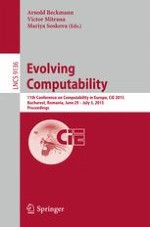2015 | OriginalPaper | Buchkapitel
Is Human Mind Fully Algorithmic? Remarks on Kurt Gödel’s Incompleteness Theorems
verfasst von : Mircea Dumitru
Erschienen in: Evolving Computability
Aktivieren Sie unsere intelligente Suche, um passende Fachinhalte oder Patente zu finden.
Wählen Sie Textabschnitte aus um mit Künstlicher Intelligenz passenden Patente zu finden. powered by
Markieren Sie Textabschnitte, um KI-gestützt weitere passende Inhalte zu finden. powered by
